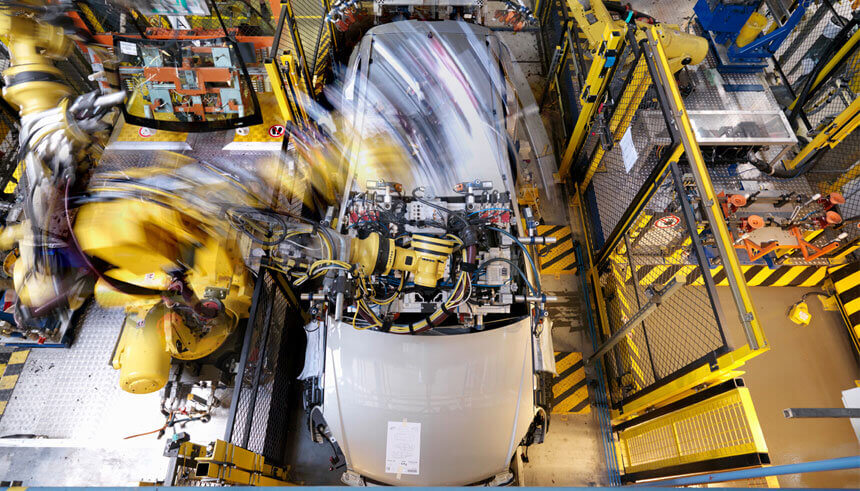US-Asia Business
US-China Market Watch: Tencent vs. Alibaba, China Robots
By Angela Bao

Your monthly roundup of the latest US-China business and industry news.
Alibaba signs U.S. entertainment licensing deals
Youku Tudou, the streaming services arm of Chinese tech giant Alibaba Group Holdings Ltd., has signed content licensing deals with NBCUniversal and Sony Pictures Television. Youku Tudou subscribers would get access to hundreds of films and television shows, and even faster access to new and newly released titles. Variety reports that NBCUniversal will also provide special entertainment-related programs to be hosted exclusively on Youku.
These deals signal the intense competition between Alibaba and its two major domestic rivals, Tencent and Baidu, as Alibaba tries to expand beyond its main e-commerce business. The deals come after the announcement that Alibaba was reorganizing its entertainment and media divisions in an attempt to re-strategize, after that division posted a $513 million loss in in its fiscal second-quarter earnings and lagging behind its rivals.
Clash of the titans: Tencent vs. Alibaba
Entertainment isn’t the only area where Alibaba and Tencent are going head-to-head—they are both venturing into brick-and-mortar stores, as well. In a move that mirrors one Alibaba made in November, Tencent has also purchased a stake in a supermarket firm, Yonghui Superstores Co. Bloomberg reports that Tencent purchased a 5 percent stake in the grocery retailer for $639 million. Alibaba had reportedly paid $2.9 billion for a stake in China’s top hypermarket, Sun Art Retail Group.
Now Tencent is also gunning for Alibaba’s e-commerce throne: Tencent, in partnership with e-commerce company JD.com (of which Tencent is a major shareholder), has invested over $600 million in Chinese online retailer Vipshop, which specializes in discount fashion sales. JD.com has invested $259 million, and together they own a 12.5 percent stake in Vipshop. According to the Wall Street Journal, Tencent and JD.com’s strategic investment aims to lure some of Alibaba’s market share away, particularly in apparel and female consumers.
China bike-share giants talk potential merger
Investors in China’s two largest bike-sharing companies, Ofo and Mobike, are talking about a potential merger as a way to curb the high operational and expansion costs.
Zhu Xiaohu, founder of GSR Ventures, which funded Ofo, was quoted saying that a merger is the only way for either company to become profitable, despite saying three months earlier that a merger was unlikely. Although Mobike and Ofo control 95 percent of China’s bike-share market, they require a significant amount of capital just to stay afloat—Ofo is reportedly trying to raise another $1 billion in funding, despite having raised $700 million this July from Alibaba, Hony Capital and Citic Private Equity. Mobike received $600 million in financing this June, led by Alibaba’s rival, Tencent.
According to Bloomberg News, Tencent and Alibaba have a habit of backing rival companies and then merging them together (as they did with Chinese ride-hailing company Didi Chuxing).
China’s robot output reaches 100,000
China has surpassed its goal and has reached an annual production of 100,000 industrial robots in 10 months—and the full year’s output is on track to reach 120,000. The government’s original robotics-specific five-year plan, Robotics Industry Development Plan, listed its goal to produce 100,000 industrial robots annually by 2020.
China accounts for one-third of global demand for robots, as part of its 2020 plan to upgrade all factories to become more technologically advanced. Although in 2015 two-thirds of China’s robotic supply was provided by foreign companies, domestic firms are now rising to the challenge and narrowing the discrepancy.
Amazon and Google open new centers in China
Amazon’s cloud computing unit, Amazon Web Services (AWS), opened its second Chinese data center in the northern city of Ningxia, further emphasizing the importance of the Chinese market to its business. According to a press release, AWS believes that the new center will play a “significant role in the development of China’s western region,” and will provide a more reliable cloud platform for its thousands of active users. Per government rules, the new Ningxia center was opened in partnership with local cloud services provider Ningxia Western Cloud Data Technology. Amazon’s first cloud computing data center is located in Beijing, operated in partnership with Beijing Sinnet Technology Co.
Google is also trying its luck again with China by opening up an artificial intelligence research lab in Beijing. The Google search engine is still blocked in China, and The New York Times speculates that this is a move to deepen the company’s relationship with China, via the country’s AI push. The AI center will be run by Fei-Fei Li, director of Stanford University’s Artificial Intelligence Lab, and Jia Li, the head of research and development for Google Cloud’s AI division.
Sign up for the Reach Further Newsletter
We’ll keep you in the know about the latest US-Asia business news and trends.
Suscríbase al boletín Reach Further
Lo mantendremos informado sobre las últimas noticias y tendencias comerciales entre Estados Unidos y China.

